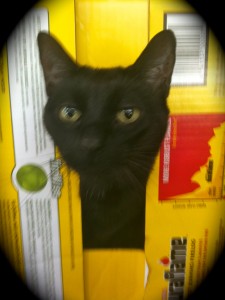
 As you may know, the effectiveness of Facebook as a social media platform has recently changed for those of us who don’t usually pay for it but maintain a social media presence in order to publicize ourselves.
As you may know, the effectiveness of Facebook as a social media platform has recently changed for those of us who don’t usually pay for it but maintain a social media presence in order to publicize ourselves.
Many of Facebook’s changes affect fanpages. Think of a fanpage as a tiny website hosted by Facebook. Companies could create one in order to have a presence on Facebook, and their fans could go click “Like” on the page. You have one in the form of your author page. Here’s mine, for example.
The model for interacting with fans has been to post messages, which appear in your fans’ newsfeed. They respond by commenting and liking and hopefully by clicking on links in order to go buy your book or listen to your podcast or read the interview or blog post or whatever.
It’s hard to find a good overview of what’s happened, but it boils down to several things:
So I wanted to test out the changes for myself. Like most writers, I use social media to sell books but also to brand myself, spread news of upcoming events, etc. I also teach online classes, so I try to sell those as well. I had just announced a couple of new ones, so I figured I’d use that post for the test.
After I’d posted something, I clicked on “Promote this Post” to see what was involved, and saw it’d be $7 to promote. Wotthehell, as Mehitabel would say, and look, they even took Paypal.
One reason I’ve been a little dubious about all this is that in August I tried advertising on various social media (Facebook and Twitter) and search engines (Bing and Google) as well as on Hope Clark’s newsletter. I did see a lot more traffic on my site, but I don’t know how much of that translated into sales of books or classes. Overall, the newsletter, which was the cheapest, was also the most effective.
And, not to my surprise, here again it didn’t make much, if any difference, even though when I looked at Facebook’s results for my promoted post, I’m told, “Promoted posts stay higher in news feed to help people notice them. So far, your post has had 113.8x as many views because you promoted it.” That translated into a total of five visits clicking through the Facebook link yesterday. Five.
And that’s my point. Like most writers, my Facebook fan page just isn’t big enough for me to worry about this much. I’ll keep maintaining my Facebook presence, but I won’t spend money on advertising there but find most effective places. I’ll also make sure I don’t confine my social media activity to Facebook but use Delicious, Google+, Stumbleupon, Twitter, and Tumblr as well.
My advice for writers is not to waste money on social media advertising but to work on their blog and attracting readers through good content.
Enjoy this advice on social media for writers and want more content like it? Check out the classes Cat gives via the Rambo Academy for Wayward Writers, which offers both on-demand and live online writing classes for fantasy and science fiction writers from Cat and other authors, including Ann Leckie, Seanan McGuire, Fran Wilde and other talents! All classes include three free slots.
Prefer to opt for weekly interaction, advice, opportunities to ask questions, and access to the Chez Rambo Discord community and critique group? Check out Cat’s Patreon. Or sample her writing here.
...

I’ll be posting several pieces over the next week with information gathered for the Bellevue College blogging class, whose second session takes place this Saturday. I teach an online class for writers interested in building an online presence; the next one is July 23, 2012. We’ll be talking about social networking and social bookmarking, which are two related but different concepts. Social bookmarking sites include Delicious, Digg, and Reddit along with the largest one of them all: StumbleUpon.
What is StumbleUpon?
StumbleUpon is a social bookmarking site. Users submit links to content they want to share, an act that is called “stumbling” the link. Other users can give a link a thumbs up or a thumbs down using the StumbleUpon toolbar, which a user can install when registering a StumbleUpon account. Content is tagged according to interests, and users randomly browsing content (also called “stumbling”) will see more popular content more often.
...
As I noted in class, I don’t agree with the methods talked about in that first link, but I do think bloggers shouldn’t overlook the power of Stumbleupon and other bookmarking sites to drive traffic to their site. I’ve seen a significant amount of traffic come from such sites, particularly Stumbleupon and Delicious.
STUMBLEUPON RESOURCES
How I Got 26000 Followers from Stumbleupon: http://www.dumblittleblogger.com/2011/01/15/how-i-got-26000-visitors-from-stumbleupon/
Stumbleupon Android App Discovery Feature: http://techcrunch.com/2010/11/17/stumbleupon-android-app-discovery/
Stumbleupon Sent 700 Million Pageviews to Other Websites in December: http://techcrunch.com/2011/01/04/stumbleupon-sent-700m-pageviews-to-other-websites-in-dec-is-growing-20-monthly/
7 Things You Should Know about Social Bookmarking: http://net.educause.edu/ir/library/pdf/ELI7001.pdf
10 Most Popular Fifteen Social Bookmarking Sites: http://www.ebizmba.com/articles/social-bookmarking-websites
Good overall list of bookmarking sites: http://www.addthis.com/bookmark.php
Delicious: http:www.delicious.com
Digg: http://www.digg.com
Reddit: http://www.reddit.com
...

The story I just finished, whose working title is “Villa Encantada,” is one whose beginning I wrote over a year ago. I picked it up last summer and added a couple of scenes, but something about it has felt wrong and it’s been just lumpy scenes stuffed full of description of a balcony garden. I was pretty sure it didn’t begin where it was supposed to, and also pretty sure that the best thing to do would be to start it again from scratch, write it, then mine the previous efforts to see what should get folded into it.
So when I read this post on plotting out stories, I decided to use it to plot out mine. All you do, according to the oridinal webpage, is complete the sentences. I’ve thought about the story and its theme and know it about halfway well enough, I think.
1. Once upon a time . . . there was a woman who could not forgive herself.
2. Every day . . . she tried to kill herself in the very smallest of ways, cigarettes and high heels on stairways.
3. Until this . . . she meets a new neighbor, who is bossy and ominous and presumptuous.
4. Because of this . . . she tries to make friends and allies in the rest of the apartment complex.
5. Because of this . . . The bitchy neighbor, who is a witch, attacks her in increasingly powerful ways, leading up to a third neighbor’s death.
6. Until finally . . . the protagonist is pissed off enough to stop feeling guilty and react in a way that saves herself.
7. For every day . . . I’m not sure what to do with this last, but I’ll wrap the story up with some gesture that shows that her forgiveness of herself is a lasting and life-changing thing.
Okay. That let me start thinking about it in terms of scenes, once I had the overall arc in my head. From there I did start from scratch and write the story from my head. In the process I found myself adding a frame story. Once I finally had that draft I could go through the first version and fold in passages that I wanted to keep. I’m still not happy with the end, but at least I have a complete story now that I can tinker with.
...

For example, that’s how I found this marvelous tool, the N+7 Machine. It describes itself thusly:
The N+7 procedure, invented by Jean Lescure of Oulipo, involves replacing each noun in a text with the seventh one following it in a dictionary. Here you can enter an English text and 15 alternative texts will be generated, from N+1, which replaces each noun with the next one in the dictionary, to N+15, which takes the 15th noun following.
I have a story, “The Ghost Eater,” that’s been sitting for a while that I need to return to, so to whack myself on the side of the head and inspire an interesting rewrite, I ran the first two paragraphs through it, in the hopes that looking at them might spark some new ideas that I could use in mapping out my strategy for the rewrite.
...
Want access to a lively community of writers and readers, free writing classes, co-working sessions, special speakers, weekly writing games, random pictures and MORE for as little as $2? Check out Cat’s Patreon campaign.

"(On the writing F&SF workshop) Wanted to crow and say thanks: the first story I wrote after taking your class was my very first sale. Coincidence? nah….thanks so much."

(science fiction, short story) “I’ve decided to join the PsyKorps,” he said. “They say I’m qualified. One in a thousand has the physiology to accept a shunt. I have it.”


This site is protected by reCAPTCHA and the Google Privacy Policy and Terms of Service apply. This site is a participant in the Amazon Services LLC Associates Program, an affiliate advertising program designed to provide a means for sites to earn advertising fees by advertising and linking to Amazon.com.